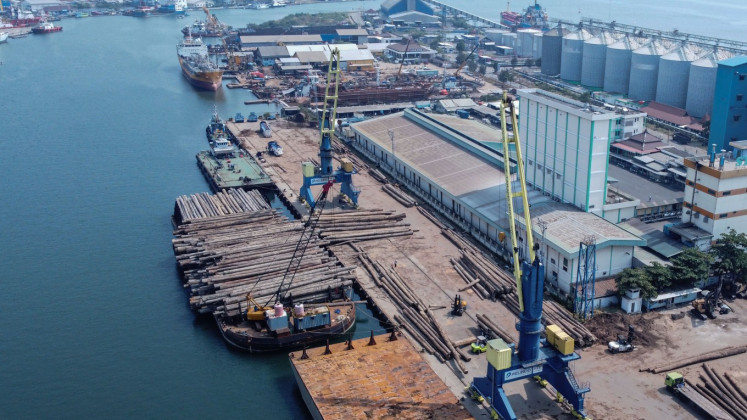Popular Reads
Top Results
Can't find what you're looking for?
View all search resultsPopular Reads
Top Results
Can't find what you're looking for?
View all search resultsPrivatization: Another promise
The government's program to privatize some 44 state companies this year, as disclosed by State Minister of State Enterprises Sofyan A
Change text size
Gift Premium Articles
to Anyone
T
he government's program to privatize some 44 state companies this year, as disclosed by State Minister of State Enterprises Sofyan A. Djalil at a meeting with the House of Representatives last week, could create the misperception that the program was designed to plug a state budget hole.
The state budget has faced the danger of a very big deficit this year, due to the cascading impact of steep hikes in oil and food prices, which increase subsidy spending, and a weakening global economy.
Right from the outset, privatization has always been envisaged, within the broader perspective of reforming state enterprises, to improve efficiency and competitiveness. The state budget stipulates revenue targets from the planned sales of state company shares, but they are not the primary objective. Moreover, privatization has never achieved its target due to strong opposition from the House.
Privatization, even in developed countries, has rarely been easy because it essentially creates a political transformation that imposes a significant change in a government's role in the economy.
The rationale of privatization is quite obvious. As the experiences of many other developing countries have proven, privatization, if well managed, with high standards of transparency and accountability, can be hugely effective. It can improve macroeconomic efficiency through the promotion of a more competitive market and more efficient (and consequently more profitable) enterprises, bringing in larger tax revenues for the state.
More efficient and competitive state companies also have a multiplier effect on downstream plants, in various manufacturing operations, because many state enterprises operate in upstream industries that produce basic materials.
Djalil said 10 of the 44 state companies to be privatized this year, through strategic sales and initial public offerings (IPO) on the Indonesian stock exchange (IDX), were carried over from last year's program.
Listing on IDX is actually the best way of selling state companies because the process is quite transparent and, most importantly, due to the tough disclosure requirements is not vulnerable to corruption. IPOs also promote a more equitable distribution of assets, because the investing public has a wide opportunity to buy shares, and are therefore acceptable to most politicians at the House.
IDX will also likely remain bullish this year despite the bearish condition of major exchanges in developed countries. New shares will deepen the stock market and increase the supply of stocks and categories of shares available for portfolio investors, and there are many state firms with high growth prospects. In more than 165 state companies, only about a dozen have been listed on the IDX but they accounted for almost 40 percent of the market capitalization.
The problem, however, is more than half of the 44 state companies to be privatized this year may not be attractive to the investing public because of their history of low returns.
To companies which do not qualify for public listing, strategic sales seem to be the best way to improve their competitiveness because not only do they need fresh capital but, more importantly, strategic partners that can provide the synergy for their robust growth.
Take for example, PT Merpati Nusantara Airlines, PT Krakatau Steel, PT Inka railway manufacturing, PT Inti telecommunications equipment maker, PT Industri Kapal Indonesia shipbuilders and PT Intirub tire company. Fresh money alone is not sufficient to strengthen the comcompetitiveness of these companies.
Nevertheless, strategic sales have always been the most difficult process because the government has yet to develop standard operational procedures, the step-by-step process to secure transparency and accountability, and close any loopholes that may still be exploited by highly corrupt officials.
The debacle faced by investors after acquiring a significant portion of shares in several state companies such as PT Semen Gresik, the container terminal operator at Tanjung Priok port and PT Indosat, may also discourage new investors from buying state firms.
Whatever the challenges, the government should push forward with its privatization program because there are already too many state companies operating in areas which private companies manage well and efficiently.
It is much better to put state firms operating in non-strategic areas in the hands of private investors, who can develop assets into profitable businesses, which creates more jobs and pays more taxes, rather than maintaining them as state assets which are easily plundered by senior officials and politicians as their cash cows.










